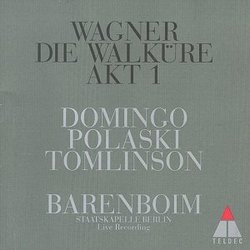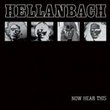| All Artists: Richard Wagner, Daniel Barenboim, Plácido Domingo, Deborah Polaski, Staatskapelle Berlin, John Tomlinson Title: Wagner: Die Walk�re, Act 1 / Domingo, Polaski, Tomlinson; Barenboim Members Wishing: 0 Total Copies: 0 Label: Elektra / Wea Release Date: 12/8/1998 Genre: Classical Style: Opera & Classical Vocal Number of Discs: 1 SwapaCD Credits: 1 UPC: 639842329422 |
Search - Richard Wagner, Daniel Barenboim, Plácido Domingo :: Wagner: Die Walk�re, Act 1 / Domingo, Polaski, Tomlinson; Barenboim
 | Richard Wagner, Daniel Barenboim, Plácido Domingo Wagner: Die Walk�re, Act 1 / Domingo, Polaski, Tomlinson; Barenboim Genre: Classical
The action of Wagner's Ring cycle begins, as singer-comedienne Anna Russell so wryly put it, in the Rhine River--"that's right, in it." But newcomers who'd like to venture beyond the standard dose of orchestral excerpts ma... more » |
Larger Image |
CD DetailsSynopsis
Amazon.com essential recording The action of Wagner's Ring cycle begins, as singer-comedienne Anna Russell so wryly put it, in the Rhine River--"that's right, in it." But newcomers who'd like to venture beyond the standard dose of orchestral excerpts may well find that the opening act of Die Walküre (the second of the cycle's four operas) offers the most immediately appealing point of access into the world of the Ring. This is, after all, the point where the cycle's first merely human characters take the stage. The process whereby protagonists Siegmund and Sieglinde fall in love and temporarily escape their doom inspired some of the most rapturous, incandescent outpouring of music to be found in all Wagner. This live concert performance from 1993 conveys both the urgency and compassion of the score with unremitting immediacy. As with his Tristan and Lohengrin, Daniel Barenboim once again gives proof that he has matured into a formidable Wagnerian, from the taut tension of the stormy prelude and the quasi-chamber-music dimensions of the first scene to the brilliantly colored apexes of the love music. Placido Domingo is captured here in top form, portraying a convincingly youthful and passionate Siegmund. Although he throws away an occasional phrase, the stamina of his voice is downright thrilling, particularly in his desperate, sustained call to "Wälse." Domingo's multifaceted approach moreover conveys the hero's fear and vulnerability as well as the tenderly phrased lyrical warmth of "Winterstürme." Deborah Polaski matches her lover's large sound with heart-racing charisma; hers is less a beaten-down, introspective Sieglinde than a woman determined to escape an awful fate through the power of love. John Tomlinson's resounding bass etches an imposing and viscerally frightening Hunding. The engineering is excellent, with brooding, dark colors from the Staatskapelle's lower strings and woodwinds as well as brightly ringing brass. This may be all the inducement you need to discover the entire Ring; for that, you might like to turn to Georg Solti's classic recording. --Thomas May Similar CDs
|
CD ReviewsA first-rate performance Sheila L. Beaumont | South Pasadena, CA USA | 05/30/2000 (5 out of 5 stars) "Recently I heard the Metropolitan Opera radio broadcast of "Die Walkure," with the versatile Placido Domingo as Siegmund. If only I had a recording of this, I thought afterward. Well, I was able to find this CD, a live performance of Act 1 featuring Domingo -- which makes me happy enough, since Siegmund does most of his singing in the first act anyway. Everyone involved does an excellent job: The orchestra, conducted by Daniel Barenboim, Deborah Polaski as Sieglinde, and John Tomlinson as Hunding are all first-rate, and Domingo sounds like the best heldentenor around these days. The last part, from "Wintersturme" and "Du bist der Lenz" on, is especially thrilling." Fascinating 02/17/2002 (4 out of 5 stars) "This is really a fascinating recording: it's from 1993 and gives a hint of what in the meantime has become the "winter Bayreuth," ie Barenboim's Staatsoper in Berlin--by now (if not at the time of the recording) the best Wagner house in the world and one of the top five opera houses overall. This disc shows the Staatskapelle in its state as Barenboim found it after the wall fell--with an incredibly "Germanic" sound which has since been mellowed a bit. Domingo had just started singing Wagner, which leads to some amazing moments as well as some slightly awkward ones. Polaski, who has since matured into the leading Elektra and Bruennhilde of our time (those who prefer Eaglen or--God forbid--Schnaut for the latter really need to go to a performance with Polaski), is not quite as "girly" as most would expect in Sieglinde, but excellent all the same. I don't agree with the other reviewer about Tomlinson, although I do prefer his Gurnemanz (but who wouldn't?!). All in all this is a fascinating disc not only because of the electricity running throughout but because it shows those of us who only know the Berliner Staatsoper from its recent performances how it got to its place today." Barenboim's "Walkure"-Almost Perfect Hans P. Bosse | Stamford, CT | 01/16/2000 (4 out of 5 stars) "This CD, which features the orchestra of the Staatskapelle Berlin, would normally rate 5 stars but for a slight flaw. On the plus side we have the excellent conducting of Daniel Barenboim, the youthful Sieglinde of Deborah Polaski and the heroic,yet lyrical, Siegmund of Placido Domingo (whose "Wintersturme" is simply gorgeous). On the negative side we have John Tomlinson, which is too bad in as much as he would have made a superb Wotan. A pity that Wotan appears in the second and third acts whereas this CD is limited to Act One. Thus, Tomlinson's bass-baritone is miscast as Hunding--a role which demands a true bass voice, preferably of the so-called "black" variety. All in all,though, this is a CD that all dedicated Wagnerians should include in their collection"
|

 Track Listings (18) - Disc #1
Track Listings (18) - Disc #1
